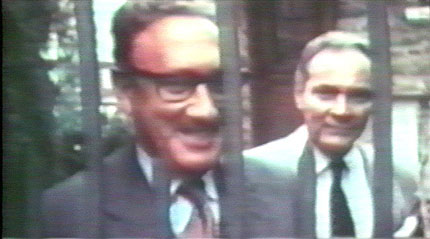The
Trials of Henry Kissinger
invites us to judge the former national security adviser a war criminal,
but the bigger question it raises now is what to do with his ideological
disciples in the Bush administration."
* * * * * * * * * *
Through a combination
of declassified documents, interviews and supposition, The Trials
of Henry Kissinger (directed by Eugene Jarecki) tries to build
a case that the former secretary of state and national security
adviser should be held to account for war crimes, much like Yugoslavia's
Slobodan Milosevic and Chile's Augusto Pinochet have been in recent
years.
Directed by: Eugene Jarecki. Written by: Alex
Gibney. Narrated by: Brian Cox. Featuring: Christopher
Hitchens, Seymour Hersh, Alexander Haig, William Safire, René
Schneider Jr. Related site: National Security Archive
Following the argument
of Christopher Hitchens' 2001 book, the film reviews Kissinger's
rise to power and charges him with complicity in three murderous
historical events - the bombing of Cambodia, the coup and related
atrocities in Chile, and the genocidal invasion of East Timor by
Indonesia. Little of the information about these events is new -
the film is really a call to consider the seriousness of the country's
actions around the world and take a hard look at not only Kissinger's
morality but our own as a people.
You may well come
out of the film convinced that Kissinger is a very bad man, with
a hand in thousands of deaths around the world and every bit the
secret, democracy-loathing conspirator that his boss Richard Nixon
was. Yet, whether he should be led off in handcuffs to face justice
is less certain, and in some ways it's not really the point.
For Kissinger
was part of a Cold War establishment that was responsible for much
more evil than simply the items catalogued in this film - and on
both sides of the Iron Curtain, they carried out these acts in service
of a cause they believed was right. So perhaps the critical question is not whether Kissinger is prosecutable
as a war criminal as such; it is whether we are prepared to label
the acts of that era as inhuman and wrong. An entire establishment
was devoted to the sometimes-murderous power politics of that time,
and we can say they were drunk with power, we can say they toyed
with the lives of little people, we can even call them criminals,
but the acts of one Kissinger are just a part of the whole international
apparatus of state that routinely spread terror around the world
during the Cold War and did it for ostensibly patriotic reasons.
So perhaps the critical question is not whether Kissinger is prosecutable
as a war criminal as such; it is whether we are prepared to label
the acts of that era as inhuman and wrong. An entire establishment
was devoted to the sometimes-murderous power politics of that time,
and we can say they were drunk with power, we can say they toyed
with the lives of little people, we can even call them criminals,
but the acts of one Kissinger are just a part of the whole international
apparatus of state that routinely spread terror around the world
during the Cold War and did it for ostensibly patriotic reasons.
As Kissinger notes in an archival interview: "The average person
thinks that morality can be applied as directly to the conduct of
states to each other as it can to human relations. That is not always
the case because sometimes statesmen have to choose between evils."
The question in
retrospect is, were these people misguided or were they just doing
what they had to, given the demands of the Cold War? Are their critics
simply being naive about what it took to fight communism?
The filmmakers'
answer is clear, and I agree with it. The rationalizations of a
Jeanne Kirkpatrick, for example, that our bloodstained dictators
were better than the other side's bloodstained dictators, should
carry no weight next to the idea that freedom and democracy are
never served by torture, murder, indiscriminate bombing, and despotism.
The lesson of Henry Kissinger is that we are locked in a 60-year
struggle not against communism per se but against the tyranny of
the powerful against the powerless.
And what a moment
it is to examine that lesson. The U.S. government is dominated today
by a clique of Kissinger's ideological descendents who, lacking
global communism as an enemy, are seizing on other pretexts such
as terrorism and drugs to exempt themselves from the democratic
process at home and wreak terror on the rest of the world at will.
The Cold War may be over, but realpolitik is alive in all its amoral,
Machiavellian glory.
Another historical
example comes to mind. During World War II, the Supreme Court approved
the mass imprisonment of Japanese-Americans who had committed no
crime, and in the decades since, its Korematsu decision has come
to be viewed as one of the worst in history. Yet, it's easy to see
issues with clarity in the absence of a crisis; it's hard to stick
to your ideals in difficult times. Over the last year, the government
has rounded up innocent Arab-Americans and imprisoned them without
charges, and few have raised a voice against it because of the widespread
sense of crisis. The Korematsu travesty suddenly is not as settled
as we thought a year ago.
The challenge
for us today is, can we learn from the likes of Korematsu and Kissinger?
If these cases violate our most basic sense of humanity, will we
now knuckle under and allow the government to be hijacked by people
who think you can't make an omelette without cracking a few skulls?
Democracy at home and morality in our policy around the world are
no less under attack than they were in Kissinger's time.